Saturday’s No Kings protests brought millions to the streets across all 50 states in the latest demonstration against Donald Trump’s administration amid a government shutdown. But many protesters are already strategizing about what to do next.
Some said continuing protests were a sign of vibrant civil resistance against the administration’s heavy-handed policies, which have challenged legal and constitutional norms in the US. They also discussed economic boycotts and strikes.
Others were concerned it would take more Americans feeling direct impact to catalyze change. “I think we have to see the demise before it can turn around, sadly, but we’re here to make sure that doesn’t happen,” said Eric Stone, a 35-year-old from Oklahoma who attended the protest in Washington DC.
Guardian reporters covered protests in Atlanta, Washington DC, Chicago and Los Angeles and asked attendees why they showed up, what they are hoping to see from the resistance movement, and whether the Democratic party was an effective opposition party. Here is what they said:
Washington DC
Mary Phillips
A Native American originally from the Omaha tribe in Nebraska and Pueblo of Laguna in New Mexico who now lives in Washington DC
Mary Phillips at the No Kings protest in Washington DC on 18 October. Photograph: Kirstin Garriss/The Guardian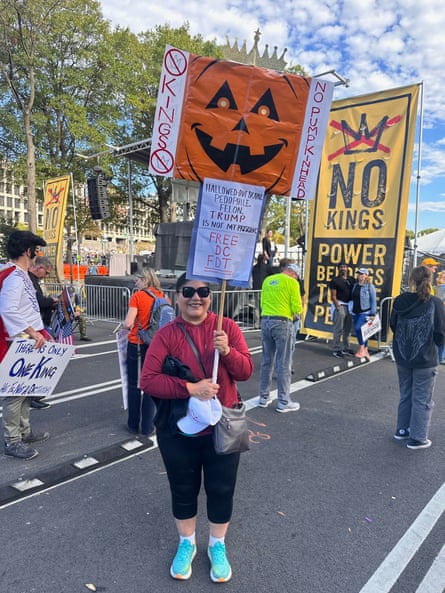
“I think there are brilliant minds who are here today who know what bad legislation, bad policies, can do to our entire country, and what the future looks like if we continue down, not able to stop what’s happening and proceeding. These are all people from different walks of life, different skills and and levels of masteries in their own disciplines.
“I believe the [leaders] who are vocal are definitely making waves and doing what they’re supposed to do, but I think there are others who are still on the fence. [There are] key issues that we need them to be 100% towards democracy, and it feels like they’re not. It feels like they are sticking to the old rules. But we have all set a set of new rules right now and they need to look at what those rules are to make up their decisions in their backrooms. And then speak on the floor what those are, what we are fighting on the streets.
“So No Kings, I think, is the pinnacle of what we’re so close to right now, having a king. Once martial law goes into place, we would be under that threat, and we don’t know what the end of it looks like really, other than changing the constitution, which I think is easier done than we thought ever could be. This movement may turn into more than No Kings. It may turn into saving lives, period – saving our life, saving our freedom to be United States citizens because anybody right now can be told you’re not a citizen any more.”
Laura Buckwald
No Kings protester
Laura Buckwald at the No Kings protest on 18 October. Photograph: Kirstin Garriss/The Guardian
“People are waking up because right now, it’s affecting people immediately in their day-to-day lives. It’s affecting our health insurance. It’s affecting our ability to just live our lives as we choose to live them. The government is trying to tell us how to run our lives, and that’s just not acceptable in the United States. As far as leadership is concerned, we’ve been disappointed on the leaders that we should have, particularly in Congress, and we’re hoping that this gives them the courage to stand up. We’re proud of what they’re doing now right now, not opening up the government until we have proper healthcare covered. But they need to do a lot more doing that, so I hope they do.
“Just yesterday, I got a notice from my health insurance company about my premiums going up – they’re almost doubling. They put straight out that they are not going to cover any healthcare that is for transition purposes, so our transgender Americans will not have coverage under the plan that I have. That is totally unacceptable. I teach young people and I’ve encountered trans youth, and they have told me that without this healthcare, it makes some of them want to commit suicide.
“I think [what Republicans have done has] been despicable. They have cut so many programs just so that they can give tax breaks to rich people, make billionaires trillionaires ... Our taxes aren’t going to go down. We’re not going to see any benefit from it and we’re going to have the same taxes, if not more, and we’re going to have less in benefits that we have paid for. This is a tyrannical regime in office right now and they need to resign. They can’t handle the job. They’re incompetent and they’re mean. They’re cruel to people in the United States and that is anti-American. It is un-Christian and it’s unacceptable.”
Mike Reid
A former Republican from Maryland who switched parties during Bill Clinton’s administration. He said he hasn’t voted for Trump in any elections
Mike Reid at the No Kings rally on 18 October. Photograph: Kirstin Garriss/The Guardian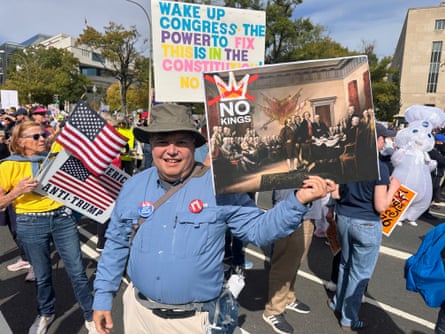
Reid was holding up a sign of the founding fathers with “No Kings” on it.
“It’s actually my wife’s idea, but these were the original No Kings gang and they’re the ones who first had said ‘no kings in America.’ And then on the back we have the original Bill of Rights, which has the part about freedom of speech, freedom of press, freedom of religion and the right of people to peaceably assemble. So we and the people here are standing up for what America is supposed to be … We’re the ones who represent what real America is. Those rightwingers and the White House and Congress – they are betraying everything this country was supposed to be about, and that’s why people, common people, have to stand up.
“I think that some Democratic governors like Gavin Newsom [in] California and JB Pritzker in Illinois are doing very well. They’re standing up. And I mean, there is a limit to what they can do with the bloc, they’re totally out of power right now. But state government, Democratic state governors, some of them are standing up – not all unfortunately, but some of them.
“I grew up in a Republican family. I was Republican up until about 20-some years ago, back when the party was about limited government, fiscal responsibility, individual rights. They have betrayed all of that. And the party that today calls themselves Republicans – they’re not Republicans, they’re fascists, and they’re betraying my great-great-grandfather who served in the Union army in the civil war.”
Eric Stone, 35
Identifies as an independent and said most of his family are Republican Trump supporters
Eric Stone of Oklahoma at the DC No Kings protest on 18 October. Photograph: Kirstin Garriss/The Guardian
“My family is Maga; my family is Trump supporters. I grew up in a small town where they didn’t want a dictatorship. They didn’t want people who were disrespectful to women. They didn’t want people who were racist and all these hateful things. And yet here they are supporting and cheering on this man like they want him to be the second coming of God. And now that I’m out here protesting this, it’s like … everybody in that circle drank the Kool-Aid.
“I got people losing their jobs [around me because of the shutdown]. They’re scared that they can’t pay their bills. They’re stressing … and they’re everyday people who work their jobs and work for this country to keep it running. And we’re going to tell them they shouldn’t be paid for, what for?
“I support what they stand for. For the most part, you’re not going to agree with everybody on everything. However, I feel like Democrats, they don’t have, for a lack of better terms, the balls – they’re too weak, because we always end up in this situation. The Democrats just want to talk for long hours and go on TV and do these events, which is beautiful … It’s powerful. However, you have access to that building right there. We’re standing right next to the Capitol building. Go do something about it.”
Shawn Skelly
Former assistant secretary of defense for readiness in the Biden-Harris administration (only the second-ever out trans person to hold a Senate-confirmed position) and the co-founder of Out in National Security. She was a speaker at the rally
Shawn Skelly at Washington DC’s No Kings protest on 18 October. Photograph: Kirstin Garriss/The Guardian
“The United States military is made up of people from every background, from every part of the country, to include immigrants and to include LGBTQ people. [Trump officials have] decided that you can’t allow transgender service members to serve. [These members have] been in command of units flying aircraft. They are high-end engineers. They are small unit leaders. None of them have blown up or failed or been drummed out of service because of the fact that they’re transgender. Each and every one of our 2.1 million service members are American heroes in their own way. You can’t have people in that institution while you’re trying to make trans people the enemy and the reason for oppression in that way.
“There should never be a shutdown, frankly, and that it’s lasted this long is the fault of the [Republican] party, the political party that has all the levers of power right now … and a very willing supreme court to let them do pretty much what they want to do, pending appeal. This is democracy in action right here. This is our constitution and our civil rights in action. It’s about ‘we the people’. As Lincoln said in the Gettysburg Address, it’s government of the people, by the people, for the people. This is America at its best.”
Los Angeles, California
Ginny Eschbach, 72
Turned out on Saturday for her 42nd protest since Trump’s inauguration. She wore a SpongeBob SquarePants costume to be ‘whimsical’
Ginny Eschbach, center left, at the Los Angeles No Kings protest on 18 October. Photograph: Lauren Gambino/The Guardian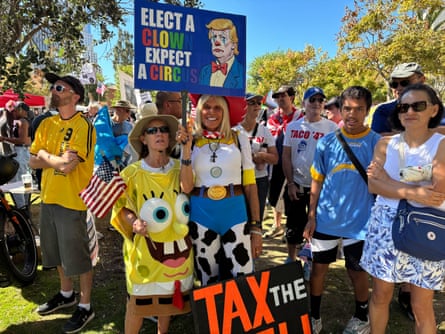
“I have felt that the movement needed a face for a long time, someone to rally the troops, who we respect and admire. But who is that? I do not know.” She suggested it might possibly be a figure like Barack Obama. “There’s all these groups and these protests all coalesce, but I’m afraid it’s too fragmented. There needs to be one movement.”
“This is not a joke,” she said of Republicans’ resistance to negotiate with Democrats over the expiration of Affordable Care Act subsidies. “If they defund people’s health insurance by not continuing the subsidies, it’s gonna be a mess. Even if they got that through, our healthcare is being so eroded by cutting science funding. There’s already reports of rural hospitals closing down. This is just going to spread through the country. It’s going to be a nightmare.”
Eschbach said she will definitely continue to protest – sometimes she will attend two to three a weekend. She is currently canvassing to help pass Proposition 50 in California, part of the plan to counter Texas’s gerrymandered maps. “I’ll just carry on,” she said. “I write postcards, I go to protests, I talk to people. I’ll do whatever I can.”
Talia Guppy, 46
Social worker in Los Angeles
Talia Guppy at the No Kings protest in Los Angeles on 18 October. Photograph: Lauren Gambino/The Guardian
Guppy comes from a long tradition of social justice activism – her parents marched with Cesar Chavez and the United Farm Workers. “The least I can do is be out here,” she said.
Among the leaders stepping forward, Guppy mentioned her state’s governor, Democrat Gavin Newsom, who is widely expected to run for president in 2028. She credited the governor with going “head to head and toe to toe” with the president. “Sometimes we have to fight fire with fire,” she said. “We can’t always take the easy road.”
Guppy said she has many friends who are federal workers and have told her they want Democrats to keep fighting to preserve access to affordable healthcare and to constrain the Trump administration.
“I’ve been protesting since the first big raid on June 6,” she said, and vowed to continue. “We’ve been doing as much as we can anytime that we can because it has to continue. If we lose the momentum, then we lose the fight.”
Taylor G, 55
No Kings protester
He said some people have stepped up to try to check Trump – the unions, certain universities and among Los Angeles’s entertainment industry, including Jane Fonda. But he said he has been disappointed so far by the lack of response from the “dotcom” companies, such as Facebook and other tech giants. “All of those companies just seem to be going along with it because it’s good for their business,” he said.
“People have to get way out of their comfort zones,” he added, suggesting the left-leaning movement needed more leaders willing to venture into less friendly territory and try to persuade people who may not be ideologically aligned with Democrats. “Even though we might not agree on everything, we could agree that what’s going on in the country is not good,” he said. He added that he has friends who have left the country because of the Trump administration’s immigration crackdown.
He approved of the Democrats’ hardball approach to the government shutdown and would absolutely be willing to walk off the job. “I think that we need to do a lot more like what they do in Europe, a general strike, meaning everybody walks out, not just Democrats,” he said.
Chicago, Illinois
Oscar Gonzalez, 28
From the west side of the city
Oscar Gonzalez at Chicago’s No Kings protest on 18 October. Photograph: Siri Chilukuri/The Guardian
“My parents are immigrants. I love them to death. I want Chicago to be a safe city. I want America to be a great nation for everybody. No human’s illegal, so I’m here to embody that and show everybody that we have all the power to make change.
“We need a Cesar Chavez, Malcolm X, Martin Luther [King], we need somebody to embody. Fred Hampton, you know, we’re in Chicago.”
Abel Mebratu, 43
From Rogers Park, a neighborhood in Chicago
Abel Mebratu at the No Kings protest in Chicago on 18 October. Photograph: Siri Chilukuri/The Guardian
Mebratu was carrying a sign depicting Silverio Villegas-González, who was killed by Immigrations and Customs Enforcement (Ice) last month.
“[I’m here] giving a voice to a voiceless man that has been taken from us – unfairly and unlawfully – and his kids need justice.
“I’m originally from Ethiopia and I consider myself a Chicagoan. We have values that we share and when our values are attacked, we come together. We’re led by our values and what we stand for and what we want to pass on for our next generation.”
Lindsay Weinberg, 43
No Kings protester
Lindsay Weinberg at the No Kings protest on 18 October. Photograph: Siri Chilukuri/The Guardian
Weinberg held a sign referencing her great-grandmother, who died in the Holocaust.
“It’s really personal to me when I hear people getting grabbed off the streets and taken away … I mean, many, many victims of the Holocaust don’t know what happened to their relatives, but I happen to know that [my great-grandmother’s] bones are in a mass grave … that’s important history for people to remember.
“People are getting disappeared. People are hiding. People are being murdered. People are being wounded. People are experiencing trauma. It’s escalating.”
Atlanta, Georgia
Geoff Sumner, 68
A retired military veteran from Stone Mountain, Georgia
Geoff Sumner at the No Kings protest in Atlanta on 18 October. Photograph: George Chidi/The Guardian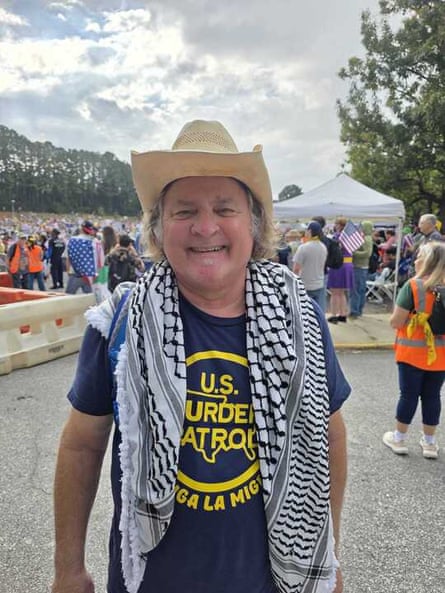
“There don’t seem to be any [leaders of the resistance] at the moment, so we’re it. Right now we got nobody. Where are they? [Chuck] Schumer-crats? Hakeem [Jeffries]? We got nobody.”
Sumner doesn’t agree with what the Democrats are doing regarding the shutdown. “We don’t need to negotiate with fascists … You want our votes? Stop all this fascism. Stop all this arresting people in the street … It’s a hell of a lot more than healthcare, ain’t it?”
“We gotta get the Trump regime out – all of them out. We gotta do it fast before they consolidate whatever they’re doing … How far should we go? That’s up to every individual. But I think people in America are in denial or they don’t know how bad it’s fixing to get.”
Jake Riley, 44
Project manager from Atlanta
Jake Riley at Atlanta’s No Kings protest on 18 October. Photograph: George Chidi/The Guardian
“I would say AOC, first of all, she would be a leader if I had to pick somebody. She would probably be up there. But as far as the protesters and on-the-ground people? I think it’s better if it’s more of a loose alliance of people. I don’t really think we have a leader structure.
“After the rally, we have to get [everyone] running for every office imaginable. There’s lots of contests that go unchallenged.”
Joshua Wilson, 22
Multimedia producer from Lawrenceville, Georgia
Joshua Wilson at the No Kings protest on 18 October. Photograph: George Chidi/The Guardian
“I work with a lot of government officials at my job as clients. With the shutdown happening, I’ve been getting less work … and less work. Recently my boss politely told me, ‘Hey, you know, if you don’t want to come to work’ … I can just stay home on certain days because of it. I do think Democrats are doing the right thing, but granted it does affect me and affect me in a big way. So I’m willing to risk my paycheck for doing what’s right.
“I feel like this [protest] is actually something. We should be joining organisations, reading up, getting educated and knowledgeable about the situation, or at least listening to outlets. You know, at least trying to join the community.”

 German (DE)
German (DE)  English (US)
English (US)  Spanish (ES)
Spanish (ES)  French (FR)
French (FR)  Hindi (IN)
Hindi (IN)  Italian (IT)
Italian (IT)  Russian (RU)
Russian (RU)  3 weeks ago
3 weeks ago


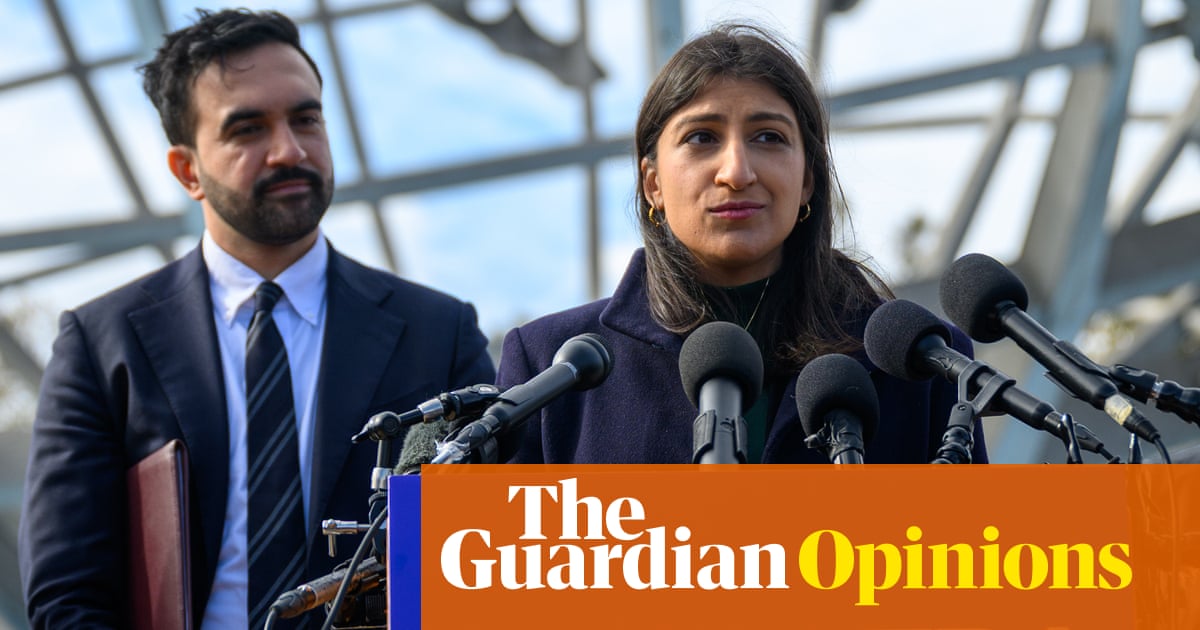




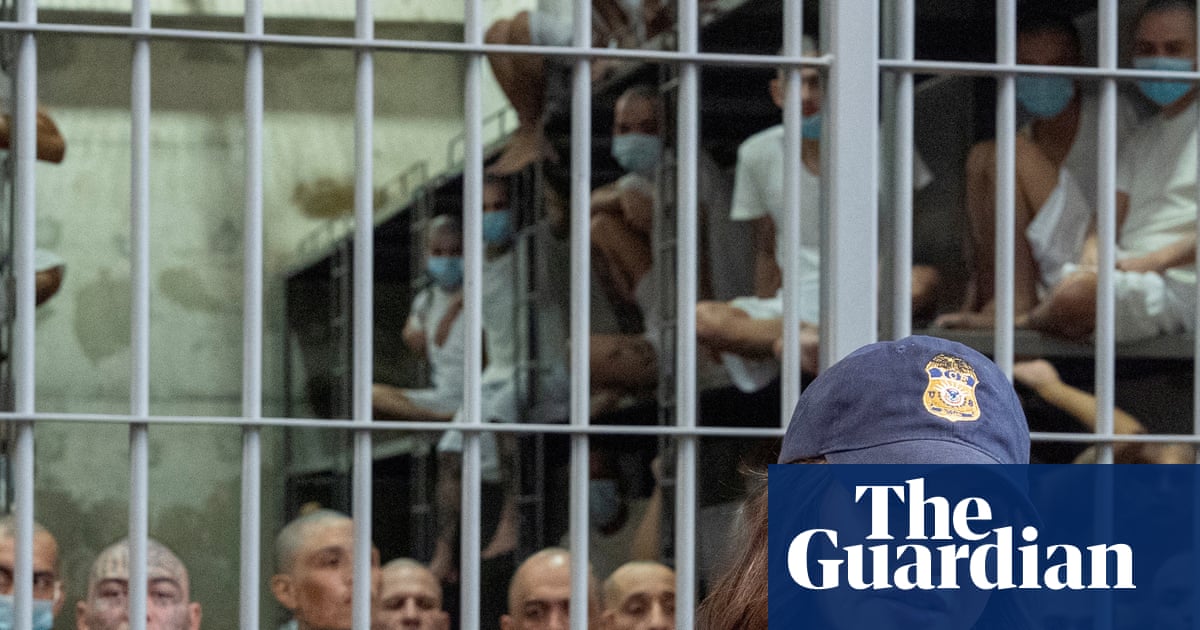
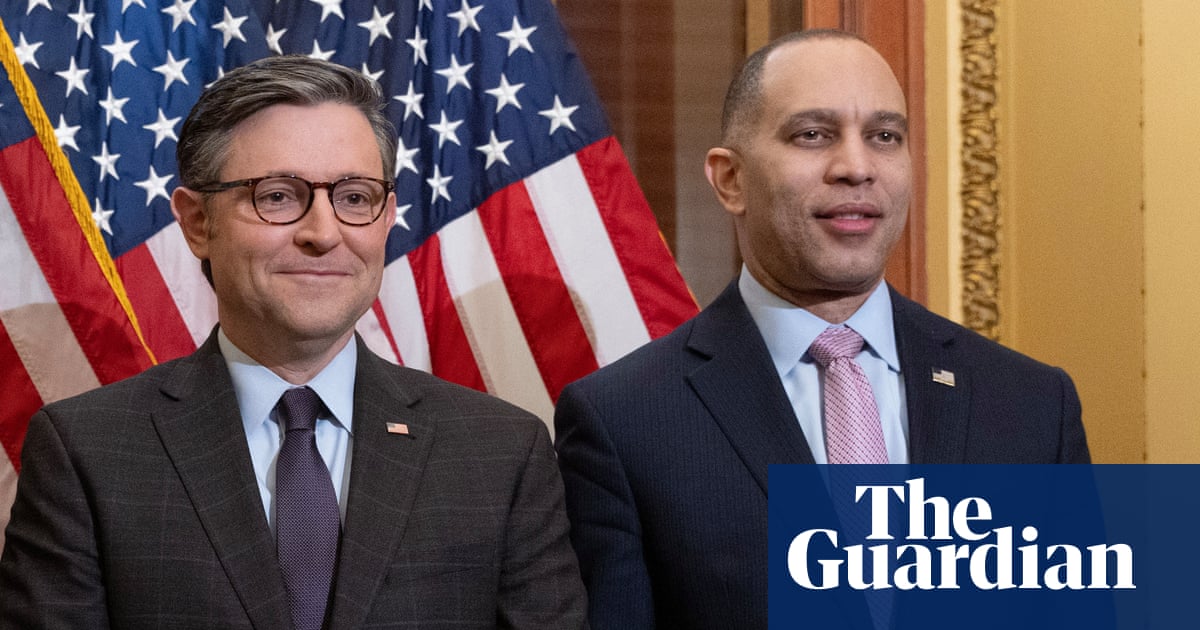







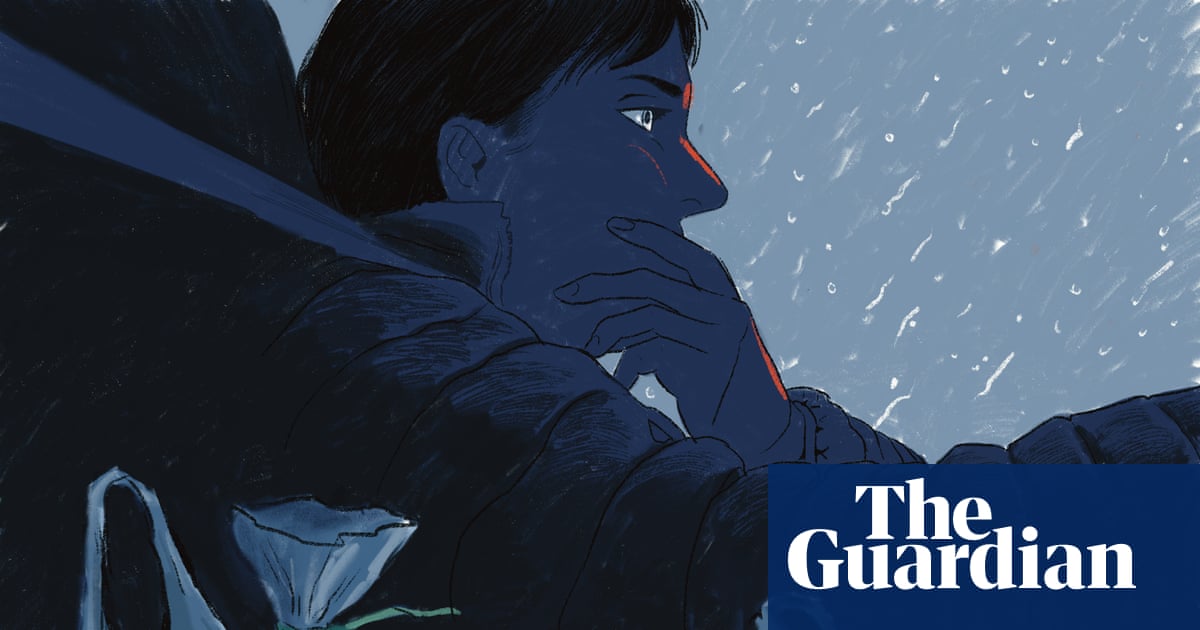




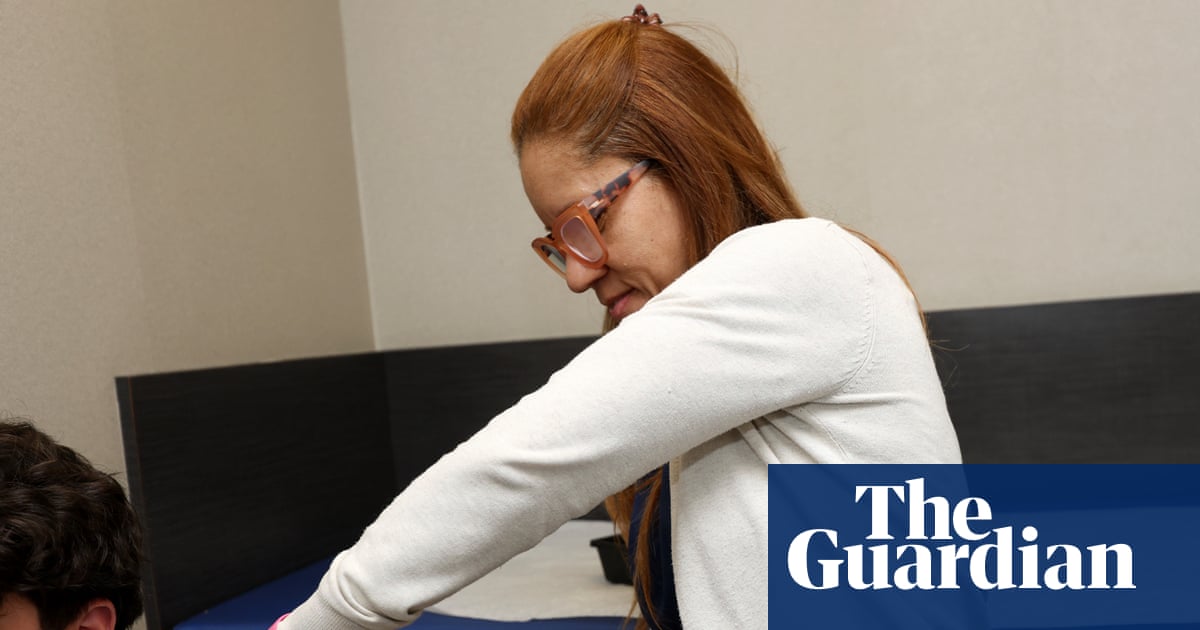
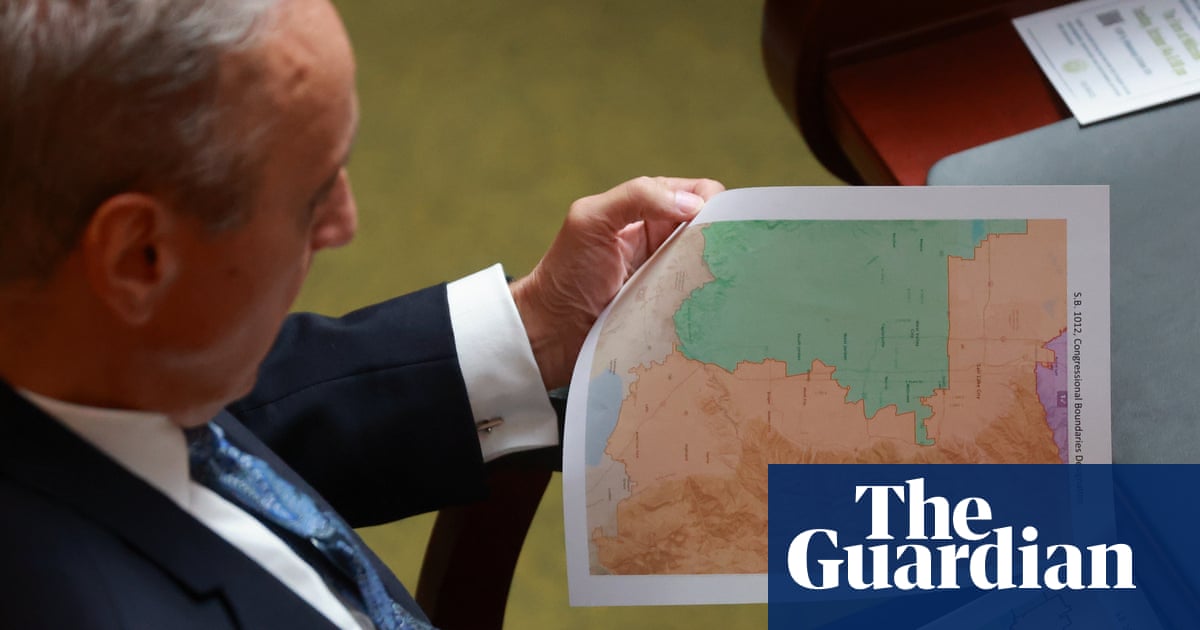
Comments